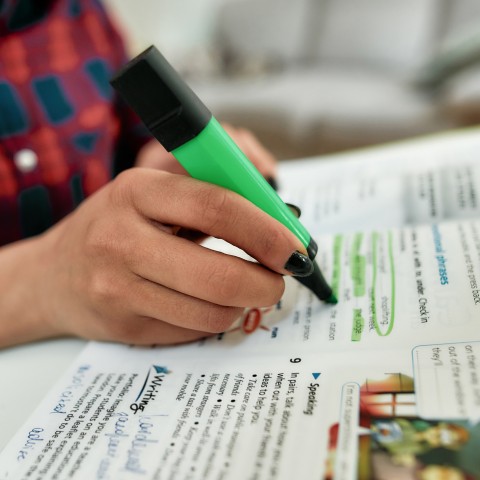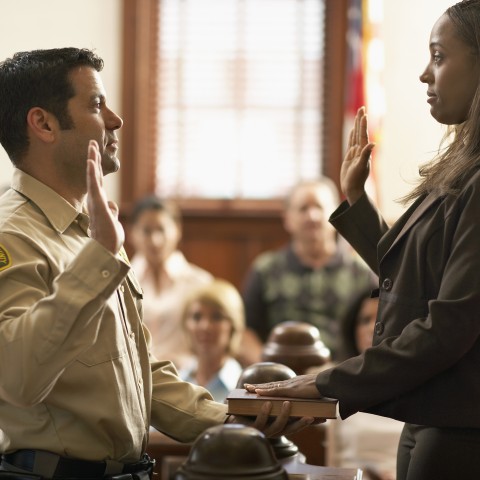
When learning a new language in a foreign country, it can be stressful to communicate in your daily interactions. One great way to make your conversations smoother is to memorize a few common English phrases for beginners.
In this article, we’ll teach you 40 basic phrases in English you need to know for day-to-day activities and interactions. You’ll learn phrases for introducing yourself, being polite, shopping & dining, and asking for help.
Ready? Let’s go.
 Table of Contents
Table of Contents
- Greetings and Self-Introductions
- Courtesy Phrases and Social Expressions
- Dining and Shopping Phrases
- Asking for Help
- Conclusion
1. Greetings and Self-Introductions
Our first set of English beginner phrases consists of those you would use to greet others or introduce yourself. We have included phrases of varying formality levels, adding notes where needed.

Hello. / Hi. / Hey.
Meaning:
These are basic phrases used when first greeting someone. “Hello” is the most formal, “hi” is less formal, and “hey” is informal.
Examples:
“Hello, Mrs. Warren.” [Formal]
“Hi Sharon.” [Less Formal]
“Hey Sharon!” [Informal]
Good morning.
Meaning:
This phrase is used to greet someone in the morning. You may use it to begin a conversation or just to be polite when walking past someone.
Example:
“Good morning, Mr. Sandoval.”
Good afternoon.
Meaning:
This phrase is used to greet someone in the afternoon. It’s used the same way as “good morning.”
Example:
“Good afternoon, Polly.”
Good evening.
Meaning:
This phrase is used to greet someone in the evening. It’s used the same way as “good morning” and “good afternoon.”
Example:
“Good evening, Ivan.”
Nice to meet you.
Meaning:
This is a polite phrase used when first meeting someone. It’s most often said right after “Hello,” or after someone has told you their name.
Example:
A: “Hello, my name is Karen.”
B: “Nice to meet you.”
My name is ___.
Meaning:
Use this phrase to tell someone your name. In formal situations, you should give both your first name and your last name. In more casual situations, it’s better to give only your first name (or even a nickname).
Examples:
“My name is Jack Frost.” [Formal]
“My name is Jack.” [Informal]
I am ___.
Meaning:
You can use this phrase for many different purposes. For example, you can tell someone your age or occupation. You can also express your personality traits or states of being this way.
Examples:
“I am 22 years old.” [Age]
“I am a writer.” [Occupation]
“I am shy.” [Personality Trait]
“I am tired.” [State of Being]
I’m from ___.
Meaning:
Use this phrase to tell someone what country, city, or geographic location you are originally from.
Examples:
“I’m from the United States.” [Country]
“I’m from China.” [Country]
“I’m from Manila.” [City]
“I’m from Africa.” [Geographic Location]
How are you?
Meaning:
This phrase is normally used with people you have met before. It’s a polite phrase meant to show that you are interested in the other person’s wellbeing.
Important Note – In the United States, you would normally answer with “I’m good,” or “I’m well,” and then repeat the question to the other person.
Example:
A: “Hello, how are you?”
B: “I’m well, and how are you?”
Goodbye. / Bye.
Meaning:
This phrase is used at the end of a conversation, right before you leave the other person. “Goodbye” is a little bit more formal than “Bye.”
Important Note – To be extra polite, you can say something like “It was nice talking to you,” before saying goodbye.
Example:
“It was nice talking to you. Goodbye.”
See you later.
Meaning:
This is a less formal way of saying goodbye. You can use it in more casual situations, when you plan on seeing the other person again in the future.
Example:
“Thank you for the talk. See you later!”
- → Learn even more useful English phrases for beginners in our vocabulary list 10 Lines You Need for Introducing Yourself and our blog post The Best Ways to Say Hello in English.
2. Courtesy Phrases and Social Expressions
In this section, you’ll find simple English phrases for daily use. Learning how and when to use these expressions will help you sound polite in a variety of contexts.

Please.
Meaning:
This is a very polite phrase you should use anytime you ask for something.
Examples:
“May I have this, please?”
“Can you please pass the salt?”
Thank you. / Thanks.
Meaning:
These are polite phrases you should use after someone gives you something or helps you in some way. “Thank you” is more formal than “thanks.”
Example:
“Thank you for your help earlier.” [Formal]
“Thanks for everything!” [Informal]
You’re welcome.
Meaning:
This phrase is used after someone says thank you. It can be used in both formal and informal situations.
Example:
A: “Thanks for everything!”
B: “You’re welcome.”
Sorry.
Meaning:
You can use this phrase anytime you inconvenience someone (for example, if you get in their way by accident or step on their foot).
Example:
“Sorry! I didn’t see you there.”
That’s okay.
Meaning:
You can use this phrase after someone says sorry. It means that you are not upset with them.
Example:
A: “Sorry! I didn’t see you there.”
B: “That’s okay.”
Excuse me.
Meaning:
You can use this phrase in two different ways: 1) to get someone’s attention, or 2) to politely ask someone to move out of the way.
Example:
1) “Excuse me. Where does this train stop next?”
2) “Excuse me, I need to get through.”
Take care.
Meaning:
This is a polite phrase you can use to end a conversation with someone. It means that you want them to stay well and safe until the next time you meet.
Example:
“I enjoyed our chat. Take care.”
May I ___?
Meaning:
Use this phrase to ask permission to do something.
Examples:
“May I smoke here?”
“May I use the restroom?”
“May I go with you?”
Important Note – You might also hear the common phrase “Can I ___?” used for the same purposes. However, “May I ___?” is the correct way to form the phrase. This is because “can” indicates ability, while “may” is used to ask for permission.
Could you (please) ___?
Meaning:
You can use this phrase to politely ask someone to do something. You can use it with or without the word “please,” but using this word will make you sound more polite.
Important Note – Using the form “could you” is considered more polite than using “can you.” It shows a degree of respect and seems to give the other person more choice in whether they help you or not.
Examples:
“Could you turn off the AC?”
“Could you please open the window?”
- → In our blog post Proper American Etiquette in the United States, you can learn more about how to be polite and courteous while in the U.S.
3. Dining and Shopping Phrases
Whether you love eating out at restaurants or simply want to be prepared for your next trip to the grocery store, these useful English phrases will help you make the most of your interactions.

Can I get ____?
Meaning:
This phrase is most commonly used in restaurants to order something from the menu.
Examples:
“Can I get the shrimp alfredo?”
“Can I get another glass of wine?”
___, please.
Meaning:
This is another common phrase used in restaurants. You can often use it in place of the previous phrase to order from the menu. It can also be used to ask for the check after your meal.
Examples:
“Shrimp alfredo, please.”
“Another glass of wine, please.”
“Check, please.”
I would like ___.
Meaning:
This is a useful phrase for ordering in a restaurant, but it can also be used while shopping.
Examples:
“I would like the shrimp alfredo.”
“I would like this one.”
“I would like to try on another dress.”
Important Note – This phrase can be used to describe items you want (the first two examples) as well as actions you would like to take (the last example). When used to express actions you want to take, remember to use the main verb in the infinitive form (“to try”).
Do you have ___?
Meaning:
This phrase is very useful in both restaurants and shopping centers. You can say this to a waiter, store clerk, or other staff member to ask if they have what you’re looking for.
Examples:
“Do you have vegetarian options?” [Restaurant]
“Do you have dragonfruit?” [Grocery Store]
“Do you have a smaller size?” [Clothing Store]
May I see ___?
Meaning:
You can use this phrase to ask to see something that you already know the restaurant or store has.
Examples:
“May I see the dessert menu?” [Restaurant]
“May I see that necklace?” [Store]
Could you bring ___?
Meaning:
This phrase is most often used in restaurants. You can say this to your waiter or waitress to have them bring something to you.
Examples:
“Could you bring the menu?”
“Could you bring the check?”
“Could you bring more bread?”
Where can I find ___?
Meaning:
You can use this phrase in a store to ask a staff member where something is.
Example:
“Where can I find leeks?”
“Where can I find the Asian food aisle?”
“Where can I find the restroom?”
How much is ___?
Meaning:
This phrase is used to ask how much something costs. While prices are usually displayed clearly in stores and malls, many high-end restaurants do not include the prices of menu items, so it can be helpful to ask.
Examples:
“How much is the shrimp alfredo?”
“How much is a bottle of Merlot?”
“How much is the lava cake?”
Is a credit card okay?
Meaning:
In the United States, it’s very common to pay for things using a credit card instead of cash or a check. However, smaller stores or restaurants (especially in rural or low-traffic areas) may not accept credit cards. It’s always a good idea to ask if you’re not sure!
Example:
Clerk: “That will be $32.15.”
You: “Is a credit card okay?”
Clerk: “Yes, thank you.”
Are you in line?
Meaning:
You can use this phrase to ask someone if they are standing in line (U.S.) or in the queue (U.K.). This will ensure that you don’t accidentally “cut” in front of them in line.
Example:
A: “Excuse me, are you in line?”
B: “Oh, no. Go ahead.”
A: “Thank you.”
Important Note – Here, the other person responds with “Oh no, go ahead.” This is a common response, and it means that you can go in front of them to stand in line. If the person responds “Yes,” it means you need to stand behind them.
- → Our vocabulary list Vocabulary and Phrases at the Restaurant contains a few more useful phrases you should know—check it out!
- → Curious to learn about American cuisine? Then you’ll love our article The Best American Food: All of the Dishes You Have to Try!
4. Asking for Help
Some of the most important phrases in English for beginners to learn are those for getting help. Here are some phrases for overcoming language barriers, getting directions, and more.

Do you speak ___?
Meaning:
You can use this phrase to ask if someone speaks either English or your native language. If you’re getting someone’s attention, you should also add “excuse me” to the beginning of the question to be polite.
Examples:
“Excuse me, do you speak English?”
“Excuse me, do you speak Japanese?”
“Excuse me, do you speak Spanish?”
Where is ___?
Meaning:
This is a useful phrase for asking where something is. You can ask this to someone if you’re lost or need to find a restroom, for example.
Examples:
“Where is the pharmacy?”
“Where is the community center?”
“Where is the restroom?”
How do you say ___ in English?
Meaning:
You can use this phrase to ask 1) how to say something from your language in English, or 2) ask how something in English is said in your native language.
Examples:
1) “How do you say Tienes una sonrisa bonita in [English]?”
2) “How do you say ‘You have a beautiful smile,’ in [Spanish]?”
Can you say that again? / Can you repeat?
Meaning:
Both of these phrases are used to ask someone to repeat what they’ve said. You can say this to someone if they’re speaking too fast or if you didn’t understand what they said.
Example:
A: “Would you like to have ice cream or go see a movie?”
B: “I’m sorry, can you say that again?”
A: “Sure.”
I don’t understand.
Meaning:
You can use this phrase when you don’t understand what someone just said. This phrase is useful when discussing more complex topics or when the other person is speaking too fast.
Example:
A: “Can you go downstairs to the basement for me, find the dresser I told you about, and get the map?”
B: “I don’t understand. Can you repeat?”
A: “Okay.”
Can you explain ___?
Meaning:
You can use this phrase to ask someone to explain something to you if it isn’t clear.
Examples:
“Can you explain what this sign means?”
“Can you explain what she said?”
I need a doctor.
Meaning:
Use this phrase to let someone know that you need medical attention.
Example:
“I’m hurt, I need a doctor!”
Call the police.
Meaning:
Use this phrase to have someone call the police during an emergency, for example.
Example:
“Someone stole her purse! Call the police.”
Can you help me?
Meaning:
This is a versatile phrase you can use anytime you need help with something. You can say this to a store clerk, for example, if you need help finding something.
Examples:
“Can you help me? I can’t find the restroom.”
“I think I’m lost, can you help me?”
I lost my passport.
Meaning:
Use this phrase to let someone know that you’ve lost your passport.
Example:
“Can you help me? I lost my passport.”
- → Here are some more Words and Phrases to Help You in an Emergency!
5. Conclusion

Learning these English phrases for beginners will make your basic everyday conversations so much smoother and help you sound more like a native speaker. We hope you enjoyed this lesson and learned some new phrases you can start practicing today!
You can continue improving your English with EnglishClass101.com. We provide a variety of free resources for our students, including themed vocabulary lists and grammar information. You can also create your free lifetime account for access to tons of fun and practical lessons in both audio and video format. It’s our goal to help you go from beginner to advanced speaker, and to be there for you every step of the way.
How many of these phrases did you know already? And how will you start practicing the new ones? We look forward to hearing from you!














